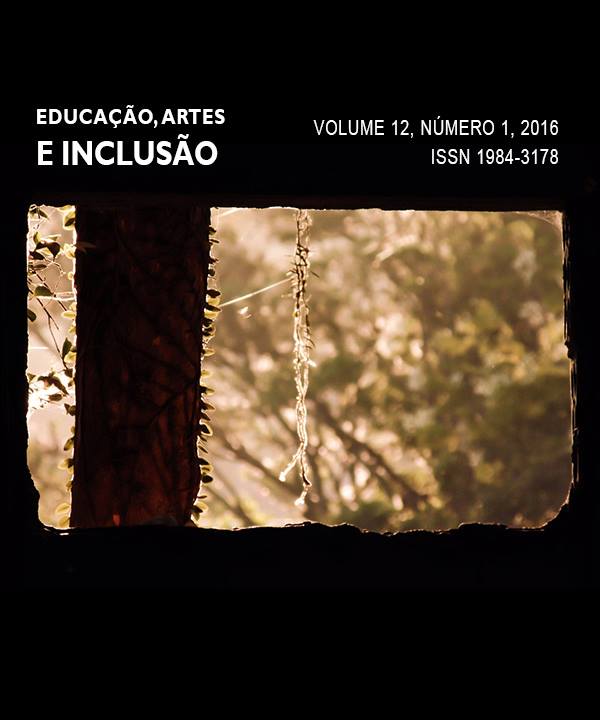ENSINO DE ARTES VISUAIS PARA CRIANÇAS COM DEFICIÊNCIAS VISUAIS NO INSTITUTO DOS CEGOS DA PARAÍBA ADALGISA CUNHA
DOI:
https://doi.org/10.5965/198431781212016045Keywords:
Artes Visuais. Inclusão. Deficiência Visual.Abstract
Este artigo apresenta parte do referencial teórico da pesquisa, iniciada no ano de 2015, desenvolvida junto aos estudantes do Instituto dos Cegos da Paraíba Adalgisa Cunha (ICPAC), a partir da atuação da discente de pós graduação em artes visuais (PPGAV UFPB/UFPE) e membro do Grupo de Pesquisa em Arte, Museus e Inclusão (GPAMI/CNPq), da Universidade Federal da Paraíba (UFPB), Maria das Graças Leite de Souza. Tivemos como principal objetivo analisar a viabilidade do ensino de artes visuais para crianças portadoras de deficiências visuais na cidade de João Pessoa – PB, a partir da atuação do ICPAC. Buscamos compreender o papel do ensino de artes visuais e sua efetiva viabilidade para crianças com deficiências visuais a partir dos primeiros contatos com as atividades artísticas. O fato de trabalhar com crianças com Deficiências Visuais desafia o professor de artes visuais, é necessário adaptar materiais, rever procedimentos e atitudes, focar nas potencialidades dos sujeitos e minimizar as limitações causadas pela falta ou baixa visão, estimular as habilidades básicas (motricidade fina, lateralidade e percepção espacial) e exercitar o potencial criativo dos aprendentes.Downloads
References
APACE - Boletim Informativo da Associação Paraibana de Cegos – Apace. Ano VI, Nº 19, Janeiro/Maio/2001, João Pessoa/PB: Impresso no Instituto dos Cegos da Paraíba Adalgisa Cunha. Disponível em: intervox.nce.ufrj.br/~joana/textos/entrel05.htm. Acesso em: 11/08/15.
DEMO, Pedro. Pesquisa participante: saber pensar e intervir juntos. 2ª Ed. Brasília: Liber Livro Editora, 2008.
HOLANDA, Maria de Fátima Duarte de; CAMINHA, Iraquitan de Oliveira. Memorias da Educação Especial: Da Integração a Inclusão. 1ª ed. João Pessoa: Editora Universitária/UFPB, 2008.
IBC - Instituto Benjamin Constant. Uma História Centenária. Disponível em: www.ibc.gov.br/media/common/Downloads_Historia_IBC.doc. Acesso em: 11/08/15.
NEDESP UFPB - Universidade Federal da Paraíba. Manual do Núcleo de Educação Especial do Centro de Educação. João Pessoa/PB: Editora Universitária, 1997.
SERRA, Geraldo G. Pesquisa em arquitetura e urbanismo: guia prático para o trabalho de pesquisadores em pós-graduação. São Paulo: Edusp – Mandarim, 2006. Parcialmente disponível em: www.google.books.com. Acesso em: janeiro 2013.
YIN, R. K. Estudo de caso: planejamento e métodos. 3. ed. Porto Alegre: Bookman, 2005.
Downloads
Published
How to Cite
Issue
Section
License
Copyright Statement
The Educação, Artes e Inclusão is a journal that follows the Free Access Policy. The articles published by the journal are free of charge, intended for educational and non-commercial applications. The articles whose authors are identified represent the expression from the point of view of their authors and not the official position of the Educação, Artes e Inclusão Journal or the Educação, Artes e Inclusão Research Group.
Authors who publish in this journal agree to the following terms:
(A) Authors retain the copyright and grant the journal the right of first publication, with the work simultaneously licensed under the Creative Commons Attribution License which allows the sharing of the work with acknowledgment of authorship and initial publication in this magazine.
(B) Authors are authorized to take additional contracts separately, for non-exclusive distribution of the version of the work published in this journal (eg publish in institutional repository or as a book chapter), with acknowledgment of authorship and initial publication in this magazine.
(C) This journal provides public access to all of its content, as this allows for greater visibility and scope of published articles and reviews. For more information on this approach, visit the Public Knowledge Project.
This journal is licensed under a Creative Commons Attribution-NonCommercial-ShareAlike 4.0 International License. This license allows others to remix, adapt and create from your work for non-commercial purposes, and although new work must give you due credit and cannot be used for business purposes, users do not have to license such derivative works under the same terms.



